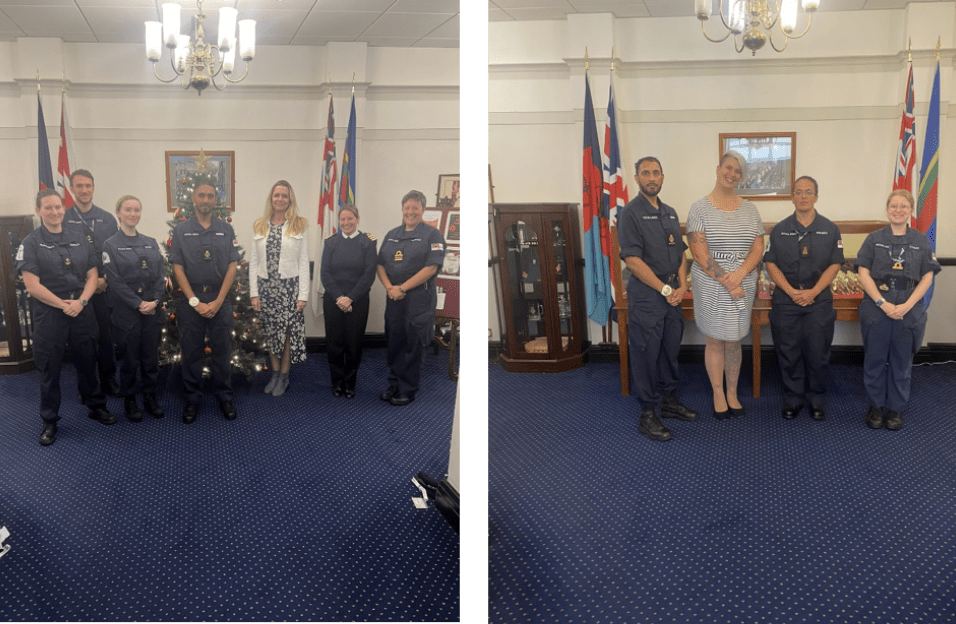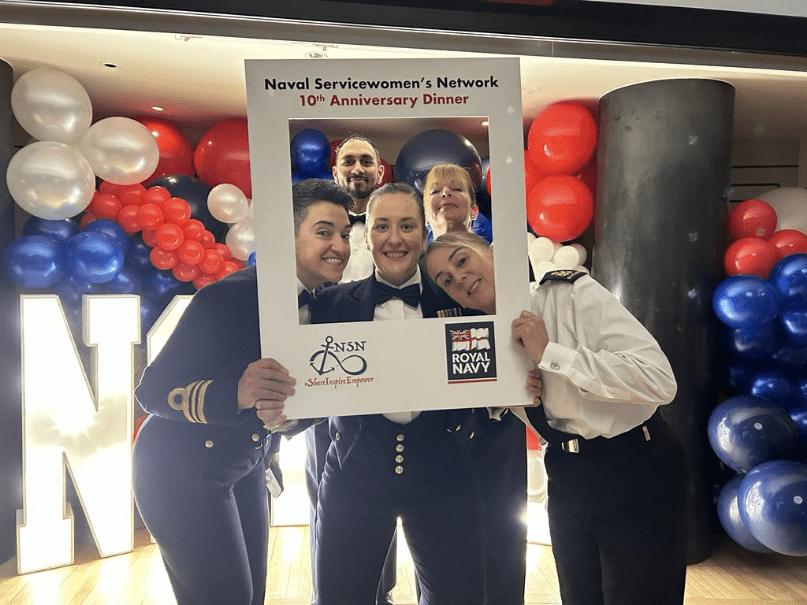
Tell us a bit about yourself, background, and your current role?
I am the Policy Officer and the Domestic Abuse Strategic Lead in the Royal Navy Police (RNP). I was born in Trinidad and find huge joy in being a husband to my incredible wife, Tina, and a father of our two boys, Kyle and Alex. With 15 years’ experience in the RNP, I continue to learn how I can use my skills and talents to make Defence a better place for all of us to work. Beyond my duties, I take pride in collaboration with initiatives to make a difference in our people’s lives, as an ally for the Naval Servicewomen’s Network (NSN), the Navy Families Federation (NFF), and the Deputy Chair of the RN Race Diversity Network.
Did you ever sit down and plan your career?
I did plan, but my journey has taught me that all plans, including career plans are never straightforward. I have always aspired to make a difference, to be my best and contribute at the highest level in any role or rank I held. Whatever rank or role you perform, remember you can also use your skills to make a difference. As the saying goes “when you hang around the barbershop long enough, sooner or later you will get a haircut.” I use this motivational quote to be consistent in setting my daily, monthly, and yearly goals. However, achieving my goals was not an easy task. In addition to being consistent, it also required unwavering commitment, discipline, and hard work to turn my career aspiration into reality.
What one thing do you believe has been a major factor in you achieving success?
The cornerstone of my success lies in promoting a positive mindset, being resilient, surrounding myself with positive people, and drawing inspiration from mentors and role models who have paved the way.
Have you faced any challenges along the way?
Yes, I have faced my share of challenges along the way both professionally and personally. Leaving everything in Trinidad to join the Royal Navy was a major leap. I left behind my family, friends, and everything that was familiar to me to start a new journey. When I initially transferred to the RNP, someone doubted if I was good enough and there were also some that questioned my ability to be a Commissioned Officer. I vividly recall failing an interview board and being told I lacked emotional intelligence. I don’t lack emotional intelligence, my performance on the day may have been down to the fact my family was separated for over two years because my stepson’s visa was denied. However, these failures and obstacles became my motivation. With the support of my amazing family, friends, and mentors, like Keisha, Nicole, Peter, Ronnie, Lizzie, Andy, Dean, Sam, and all women from our Naval Servicewomen’s Network, to name a few, who encouraged me to try again, I turned those challenges around. Now, I am not just a member of the RNP; I am a RNP Commissioned Officer and member of our RN family. If you are reading this, remember my journey is full of failures, but I continued to learn, grow, and evolve. So, I encourage you not to fear failures and risks, they are steppingstones to your success.
As a male ally, do you believe the defence sector is where it needs to be in terms of gender equality and why?
Recognising and being committed to addressing the challenges is a positive step taken by our Defence leaders. It is crucial of all of us to actively contribute to fostering a supportive environment for our women, ensuring they feel valued and respected. There are several ongoing projects aimed at re-shaping our defence organisational culture, acknowledging that meaningful change takes time. Quick solutions, in my experience, often fall short of addressing root issues. By consistently prioritising gender and diversity, we can steer our defence sector towards the inclusive organisation we aspire to be.
Thinking back over the past 5 years, what changes have you seen that have made things easier for women to progress? What more could be done?
In the last 5 years, there have been considerable progress in policy to help women progress. These include policies decisions to allow our naval women to serve in all A and V class submarines, using inclusive language, the Servicewomen’s Health Handbook, Breastfeeding and Wellness rooms, change of our hair policy, women talent programmes, menopause, Zero Tolerance to Unacceptable Sexual Behaviour, maternity, building a better Service Complaint system, and the formation of the Defence Serious Crime Unit, to mention a few.
In the future, there will be research to improve our appraisal reporting for our servicewomen taking maternity leave as well as removing orthodox gender-based ranks and titles. We need to understand how these policies are implemented in practice, if they change behaviours, cultures, and systems onboard our ships, aircrafts, submarines, bases and within our wider Defence sector, especially during operations and training serials.
We also need to continue listening to the concerns and the range of barriers our women face. Measure our impact, adjust our policies, and finally continue to hold ourselves accountable.
Have you noticed a trend towards a more diverse recruitment policy within the Royal Navy?
The RN values diversity and inclusion. Both are equally important to recruiting a diverse workforce and critical to Operational effectiveness. Diverse recruitment policy is everyone’s responsibility within our RN. We are putting more resources into our diversity and recruitment teams, even though they are small teams, they make a big impact. Thanks to our hard work we met the National Equality Standard, and our Service was the first to achieve this standard.

We understand that women and ethnic minorities face additional barriers during the recruitment process so there is a dedicated women and ethnic minority team to help them overcome these barriers. I actively contribute by organising Women in Leadership seminars, featuring influential women as guest speakers. Their guidance proves instrumental in supporting our naval women, sharing personal journeys and offering valuable tips for unlocking their full potential. Drawing from my experience as an ethnic minority from a Commonwealth background and overcoming challenges in bringing my family to the UK, I use this knowledge to assist others during this challenging period. Connecting them with the Navy Families Federation Immigration Adviser ensures tailored support for a smoother journey.
Why is being a male ally important to you?
Picture a world without women – I can’t. They have been my foundation. My mother, a resilient woman, taught me the value of strength. My wife, a woman filled with love, showed me how to cherish. My sister, an empathetic woman, guided me to understand others. My mentor, Sam, a proud LGBT+ woman, helped me discover my purpose, taught me why it is important to reflect and how to lead and make a positive impact. And a special mention to those who sponsored me. Countless women, colleagues, and friends have shaped and continue to shape my life. Being an ally for women is my way of giving back, contributing to making the Defence a better place to work.
What are some actionable steps men can take to be better allies in the workplace?
To be a better male ally, start by recognising and addressing the systemic barriers hindering women’s progress in Defence. Invest time in reading books, attend events that educate you on how to actively support women. Join a women’s network, actively participate in organising events that cater for their needs. Advocate for gender-inclusive language in policies and legislations. Listen closely to our women’s needs and channel your efforts into meaningful actions. Remember, it is your duty to educate yourself, not women, and dedicate time to helping them develop, grow, and challenge issues. Every day you do not cater to their needs is a day they endure unnecessary challenges in Defence.

Conclusion
This insightful interview with SLt Ryan Sookoo, it is evident that his commitment to fostering an inclusive and supportive environment within the Royal Navy is both inspiring and transformative. Ryan’s journey from Trinidad to becoming a Commissioned Officer in the Royal Navy Police showcases his resilience, dedication, and unwavering support for gender equality. His story is a testament to the power of perseverance and the importance of being an ally.
Ryan’s emphasis on the need for systemic change, continuous learning, and active participation in promoting gender diversity highlights the crucial role that male allies play in creating an equitable workplace. His personal experiences and professional endeavours serve as a beacon of hope and a call to action for all of us to contribute to a more inclusive and supportive Defence sector.
As we move forward, let us take Ryan’s advice to heart: recognise and address the barriers women face, educate ourselves, and actively support and advocate for gender equality. By doing so, we can create a Defence environment where everyone feels valued, respected, and empowered to reach their full potential.
Thank you, Ryan, for sharing your journey and insights with us. Your dedication and passion for making a positive impact are truly commendable. We look forward to seeing the continued progress and positive changes you and your colleagues will undoubtedly bring to the Defence sector.





Responses
Beautiful! So very proud of you and thankful for you, Ryan!